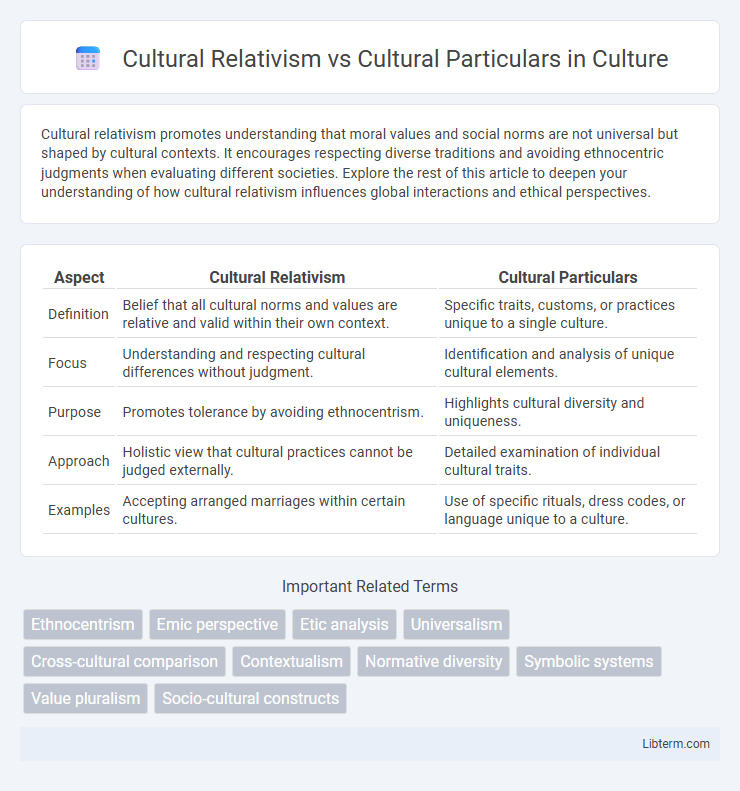Cultural relativism promotes understanding that moral values and social norms are not universal but shaped by cultural contexts. It encourages respecting diverse traditions and avoiding ethnocentric judgments when evaluating different societies. Explore the rest of this article to deepen your understanding of how cultural relativism influences global interactions and ethical perspectives.
Table of Comparison
| Aspect | Cultural Relativism | Cultural Particulars |
|---|---|---|
| Definition | Belief that all cultural norms and values are relative and valid within their own context. | Specific traits, customs, or practices unique to a single culture. |
| Focus | Understanding and respecting cultural differences without judgment. | Identification and analysis of unique cultural elements. |
| Purpose | Promotes tolerance by avoiding ethnocentrism. | Highlights cultural diversity and uniqueness. |
| Approach | Holistic view that cultural practices cannot be judged externally. | Detailed examination of individual cultural traits. |
| Examples | Accepting arranged marriages within certain cultures. | Use of specific rituals, dress codes, or language unique to a culture. |
Understanding Cultural Relativism: A Foundational Perspective
Cultural relativism emphasizes evaluating beliefs and practices within the context of a specific culture, avoiding ethnocentric judgments by acknowledging diverse value systems. This foundational perspective helps anthropologists appreciate cultural particulars, which are unique customs and traditions that define individual societies. Understanding cultural relativism fosters respectful intercultural dialogue and reduces bias in cross-cultural analyses.
Defining Cultural Particulars: Unique Practices Across Societies
Cultural particulars refer to distinct customs, rituals, and social behaviors that are unique to specific societies, reflecting their historical and environmental contexts. These practices illustrate how cultural identity is shaped by localized experiences, emphasizing variation rather than universal norms. Understanding cultural particulars helps in appreciating the diversity of human cultures beyond broad generalizations or relativistic comparisons.
The Historical Development of Cultural Relativism
The historical development of cultural relativism emerged in the early 20th century through the works of anthropologists like Franz Boas, who challenged ethnocentrism by emphasizing the importance of understanding cultures within their own contexts. This theoretical shift laid the foundation for analyzing cultural practices as products of specific historical and social conditions rather than universal norms. The distinction between cultural relativism and cultural particulars highlights how broad theoretical frameworks must account for the unique, localized expressions of culture found in diverse societies.
Key Principles Distinguishing Relativism from Particularism
Cultural relativism emphasizes understanding beliefs and practices in the context of a culture's own values and norms, promoting tolerance and avoiding ethnocentric judgments. Cultural particularism, on the other hand, focuses on detailed, specific traits and historical contexts unique to each culture without generalizing across groups. Key principles distinguishing relativism from particularism include relativism's broad commitment to cultural context as a standard for evaluation versus particularism's emphasis on individual cultural elements and their discrete meanings.
Cross-Cultural Comparisons: Values, Norms, and Traditions
Cultural relativism emphasizes understanding values, norms, and traditions within their specific cultural contexts, avoiding ethnocentric judgments in cross-cultural comparisons. Cultural particulars highlight unique societal customs and practices that shape identity and behavior, often resisting generalization across cultures. Analyzing both perspectives reveals how diverse cultural frameworks interpret social norms and guide interpersonal interactions.
The Role of Ethnocentrism in Cultural Interpretation
Ethnocentrism significantly influences the interpretation of cultural practices, often leading to biased judgments based on one's own cultural norms rather than objective understanding. Cultural relativism promotes evaluating customs within their unique sociocultural contexts, minimizing ethnocentric distortions by encouraging empathy and respect for cultural diversity. Meanwhile, cultural particulars highlight specific traits unique to societies, demanding analysis free from ethnocentric assumptions to fairly represent cultural meaning.
Ethical Challenges: Universal Human Rights vs Cultural Practices
Cultural relativism emphasizes understanding cultural practices within their own context, often challenging the application of universal human rights by highlighting diverse moral frameworks. Ethical challenges arise when cultural particulars, such as rituals or social norms, conflict with international human rights standards, leading to debates over the limits of cultural tolerance. Balancing respect for cultural diversity with the enforcement of universal human rights remains a critical issue in global ethics and policymaking.
Case Studies: Cultural Relativism in Practice
Case studies of cultural relativism in practice reveal its role in understanding diverse moral frameworks without imposing external judgments, such as the ethical evaluations of ritual practices among the Nuer of South Sudan or the medical customs of the Yanomami in the Amazon. These case studies emphasize respecting cultural context to interpret actions and beliefs, highlighting the challenges of balancing universal human rights with cultural specificity. Cultural relativism provides a critical tool for anthropologists to avoid ethnocentric bias while analyzing practices like arranged marriages in South Asia or dietary restrictions in Middle Eastern societies.
Implications for Globalization and Multicultural Dialogue
Cultural relativism emphasizes understanding beliefs and practices within their own cultural context, which fosters respect and reduces ethnocentrism in globalization. Cultural particulars highlight the unique customs and values of specific groups, challenging universal norms and encouraging tailored approaches in multicultural dialogue. Balancing these perspectives enables global cooperation by promoting both shared understanding and appreciation of diversity.
Moving Forward: Balancing Respect for Diversity with Shared Values
Balancing respect for cultural relativism and cultural particulars requires fostering dialogue that honors diverse traditions while identifying universal human rights and ethical standards. Emphasizing mutual understanding helps reconcile differences without imposing hierarchical value judgments, promoting coexistence in a globalized world. Integrating local cultural contexts with shared global values supports social cohesion and ethical pluralism.
Cultural Relativism Infographic

 libterm.com
libterm.com